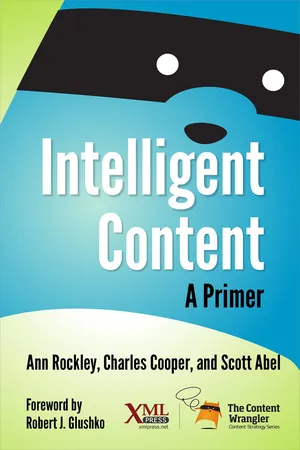![]()
| Intelligent |
| Content |
| A Primer |
|
| Ann Rockley |
| Charles Cooper |
| Scott Abel |
He who rejects change is the architect of decay. The only human institution which rejects progress is the cemetery.
—Harold Wilson, former prime minister of England
![]()
by Robert J. Glushko, UC Berkeley School of Information
Intelligent content? You might chuckle a bit when you first hear this term, because what’s the alternative? Dumb content? But don’t be fooled into thinking that intelligent content is just some clever new buzz phrase. Sure, the phrase is clever and pretty new, less than a decade old, but it is the perfect shorthand for talking about concepts, practices, standards, and tools for making effective use of information that have been evolving and coming together for much longer. This little book ties all of that together and is timely and easy to read, making it a good introduction – and I can’t imagine a more appropriate set of co-authors.
The central idea of intelligent content is that it is adaptable to multiple purposes, document types, devices, or people. This isn’t an all-or-none proposition. The amount of adaptability in formats for digital content varies on two dimensions: the degree to which the format separates semantic (what it means) information from presentation (how it looks) information and the amount of structure and organization in the semantics. A scanned print document, which is just a digital picture, is low on both of these dimensions; word processing formats are higher, especially when they use explicit formatting styles; HTML-encoded web pages are highly-structured but not usually semantic; and XML or database content is high on both dimensions, especially when it conforms to standards for describing the content types needed for different domains or activities.
Years ago I proposed the term Information IQ to capture this range of explicit semantics and structure in document formats (its technical qualities), but many people misunderstood and thought I was talking about digital or computer literacy. I think the term Intelligent Content will – and should – win out.
But no matter what we call them, the ideas that come together as intelligent content are critically important and opportune. Every system and device we interact with is getting smarter because of increased capabilities to sense, connect, and compute – and I really mean every system, not just smart homes and smart cars and smart phones. There is a great deal of hype about the Internet of Things, but there is also a great deal of innovation underway. If you search for the phrase “Internet of Things” along with almost any physical resource, chances are you will find something. Try “baby,” “dog,” “fork,” “lettuce,” “pajamas,” “streetlamp,” and you’ll see what I mean. If you want to be able to design or build smart things, you need to understand the techniques and tradeoffs involved in making the intelligent content they produce and consume.
And for every system and device we explicitly interact with, there are many more invisible ones that operate and manage the physical and digital worlds we inhabit. All of them are more robust and flexible when the content they create or capture is intelligent, making it easier for machines and computers to aggregate, share, and analyze it.
Intelligent content is also easier to customize for different people and their preferred delivery channels and devices. Designers and marketers of systems and services that interact with people need to understand how contextual and transactional information can be made intelligent, making it possible to deliver higher-quality experiences by predicting unexpressed customer preferences and requests. I’ve called this design principle “substituting information for interaction,” and it depends on having intelligent models of the information requirements for services and for the information captured and saved from previous interactions.
No one is more capable of writing about intelligent content than Ann Rockley. She began transforming mountains of printed technical documents into intelligent formats back in the 1990s, when that meant SGML. She slowly and steadily convinced the naysayers who said, “Sounds Good, Maybe Later,” that single-source publishing shouldn’t be seen merely as a cost-savings tactic. Instead, she showed us that the reuse and retargetability of intelligent content were essential strategic prerequisites for businesses to succeed in an increasingly information-intensive economy characterized by rapid technology change.
I’d strongly recommend Intelligent Content: A Primer authored by Rockley alone, but seeing her longtime collaborator Charles Cooper here (their book, Managing Enterprise Content: A Unified Content Strategy[Rockley, 2012], is a practitioner’s bible) makes me even more enthusiastic. And finally, a token non-Canadian, is co-author Scott Abel, The Content Wrangler, whose marketing and evangelism through conferences and social media have brought immense new pride and professionalism to the content industries. I just can’t imagine a more talented group of co-authors for this book, and I can’t imagine a better place to start learning about intelligent content.
![]()
Today, everything is marketing. All of the content we produce affects the customer experience. Therefore, all content is marketing and all content producers are marketers.
It used to be that we would buy a product, then look at a user manual or other post-sale content to learn how that product works. Today, however, most post-sale content is available on the Internet, and that content influences prospective buyers. Consumers may make up their minds about our products before speaking to a sales person, or they may never speak to a sales person at all.
According to Acquity, 71% of B2B customers prefer to research and buy on their own, with minimal contact with sales representatives.
According to Hershey, technology buyers report that interacting with technical content is their second-most-important pre-sales activity. Hershey also found that up to 70% of buying decisions are made based on “information [found] online well before a salesperson has a chance to get involved.”
Buyers of industrial products reported that “the only information more highly influential than pricing was detailed product in...

